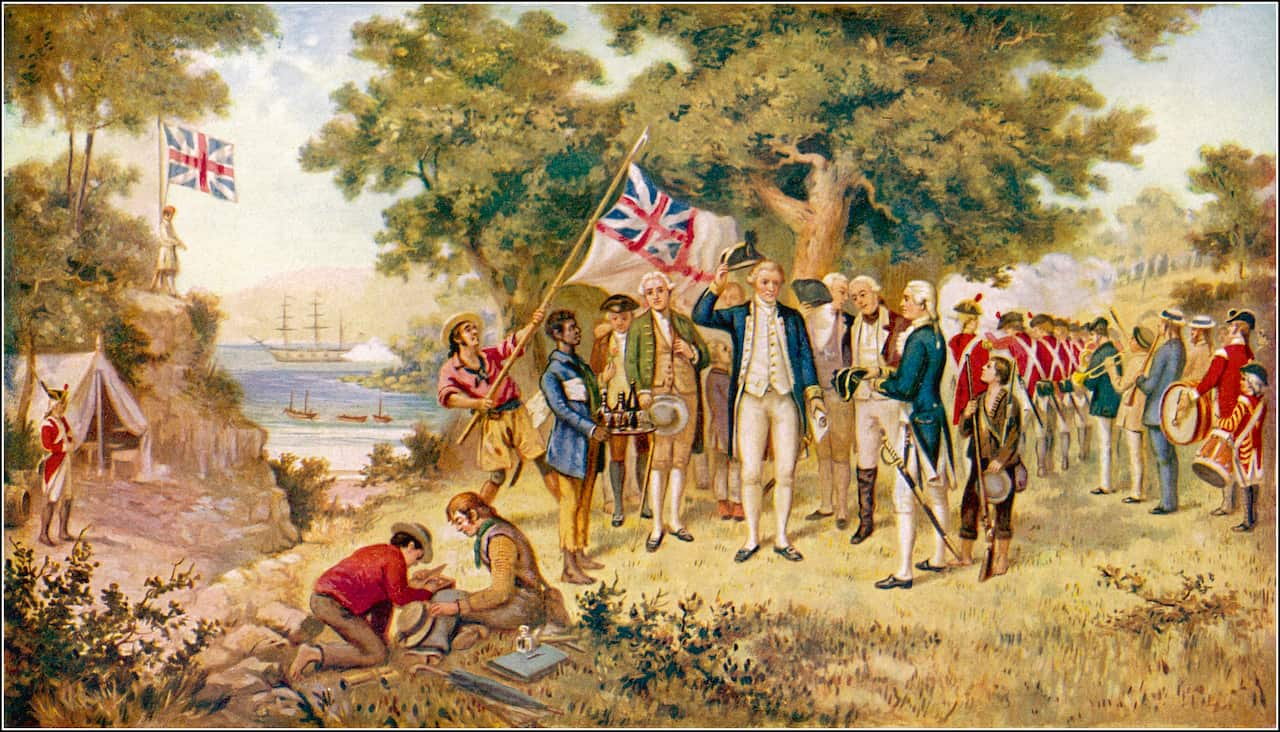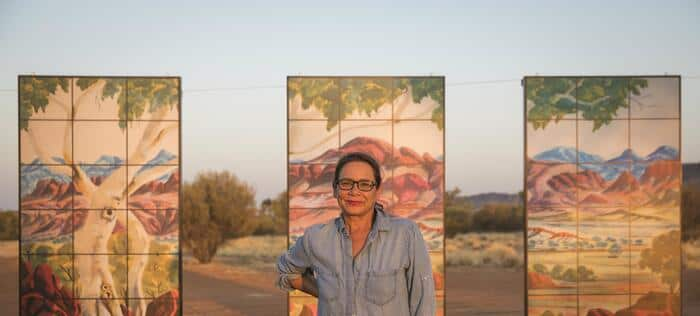Invasion to National Day of Mourning to Embassy – it’s often been a bittersweet struggle.
Many custodians and Elders have given their lives and served our people, fighting for equality, questioning the policies, and ensuring we never forget who we are, and why we are the sovereign peoples of our diverse and unceded lands, waterways, and sky country of our island homes.
In 2022, life in the colony has changed dramatically. Long before we proudly marched with our colours - the red, black, and yellow, on the shores of Botany Bay, since time immemorial children have sat silently and listened to the ancient dreaming stories passed down through the eons of oral transmission.
According to the old people, one day the return of Guwini (ancestral spirits) floating on the low-lying stratus clouds would occur. They were returning to Country, this time as white spirits and they would travel on a Barangga’ or big vessel.
'You're (they) all dead.'
In April 1770, the villages of the Kamay and Gweagal peoples were full of activity. Bush fruits and medicines were ready to be picked as the lillipillies ripened, the nights were getting cooler and the days saw women gather to stitch and prepare the possum hides for winter coats.
Upon the easterly winds the first ship from the northern hemisphere, the Endeavour, arrived close to the place known as Kundell by the Dharawal language group of Botany Bay, a name that was lost in translation and called Kurnell by the invaders.

The Gweagal warriors known as the fire clan peoples began to raise their spears; something was not right. Those on board this strange vessel had not called to seek safe passage, they looked ominous and the warriors called out 'warra warra wai'. Some historians have interpreted this as meaning 'go away.'
But the history of the Gweagal and their neighbours the Kamay, the spear peoples on the opposite shoreline at La Perouse, tells a different story.
Through the narrative of the Dharawal language, 'warra warra wai' translates to 'you're (they) all dead.'
There has been much lost in interpretations, and sadly there are still the old assumptions and ignorance fuelled by fear and the relentless systemic microaggressions of who and what we should be.
Can January 26th change our thinking and be a day to rediscover who we truly are?
Continued stewardship and unlikely friendships
Across the country there has been a mixing of our bloodlines, from the centuries-old history of trade and marriages with the Yolngu in northeast Arnhem land and Indonesia's Sulawesi communities; to the Cameleers arriving from Turkey, Afghanistan, Iran, India and the Punjab, who fell in love in the 1800’s with women from western New South Wales, Victoria, across South Australia and into the Territory - Ghan towns were established across the Wilyakali, Antikirinja, Arrernte lands.
So let me be frank, our identity is not about blood quantum and/or skin colour - it’s about bloodlines and family affiliations, a complex kinship configuration of lore and obligation that ensured our survival.
In Western Australia, early relations began with the Malay and our grandmothers, from Darwin’s Larrakia Country, found solace with the Chinese. Our Sunrise peoples along the east coast much later in history, witnessed the Irish and Scottish men, developing relationships and growing families, perhaps because they too had come from a clan system.
Our Country is full of these tender stories. More often we only ever hear about the problems as aliens in our land and not the continued stewardship and unlikely friendships.
So let me be frank, our identity is not about blood quantum and/or skin colour - it’s about bloodlines and family affiliations, a complex kinship configuration of lore and obligation that ensured our survival.
When the ancient chronicles were handed down, our lore men and women and our philosophers knew of the coming children and what we would face, safekeeping some of our inherited knowledge and birthrights.
Is it now the time to reawaken?
I am from the Bundjalung nation, a proud Widjabul Wia-bal woman with Irish/Scottish heritage and I love my ancestry.

I was 8 years old before I was counted as a human being on the national census and growing up, there was no choice to be all of me. The government, missionaries, schoolteachers and the rural town that has been our family homelands for over three thousand generations, all labelled us as just one thing - like they had with our grandparents and those before them – we were stamped as Aborigines.
Doing so ensured we were placed under the Aborigines Protection Act and government-sanctioned policies that would control our lives.
As I write this piece, once again our world is changing with isolation and lockdowns, as we talk about the pandemic it almost feels like we are living in a futuristic dystopian movie, and I am reminded of a time from our past.
A new form of annihilation
In 1788, the Barangga, the big vessel, would return to our shores on January 26th, this time into the heartland of the grass tree peoples, the Gadigal. There were many more white spirits on board and they did not observe the protocol or seek invite, rather they came with a vengeance, greed, and a very different philosophy of what land was.
This was not returning ancestors, they were attacking and trespassing and as they planted an unwelcome and foreign flag into the earth, our worlds would change drastically.
By the last day of 1788 an event occurred, with the political kidnapping of an Aboriginal Man named Arabanoo by the European invaders.
What preceded this brutality could be described in today’s world as an unleashing of biological warfare. The smallpox pandemic, spread and its destruction was evident, innocent men, women and children lay in the coves and the saltwater, bloated and floating dead. They had rushed to the cool night waters to ease the fever, but this mass and senseless killing of more than half the population of Sydney was the commencement of genocide and a barbaric western policy of dispersals that would destroy our villages, estates and homelands. Families would be separated, impacting generations to come.
The old people didn’t need a yellow star, the obvious difference of appearance was enough to be rounded up and relocated to camps, and our men incarcerated for simply speaking their language and/or protecting homes and unceded lands.
Our children were to be stolen and kidnapped, some at gunpoint, for generations to come, heads shaved and thin bodies, full of fear and hopelessness. They began to rock on their haunches, in the dormitories, the homes and institutions, the juvenile detention centres and the prisons.
The nationwide exterminations, and the dehumanising of a race of people, whom had survived the ice age, saw a dark depression take hold of some, leading to further loss of life, sadly this time by their own hands.
By the 19th century self-medication to dull the pain and find relief, became evident that this was the nightmare of colonisation and a new form of annihilation.
Where I stand
So January 26th is my Day of Mourning, to pay respect for those who before me, laid down their lives, it’s a time to gather, a time for truth-telling and listening.
As we shift the narrative, does the change of date and memory of what occurred in 1788, get lost and buried. Is it only then for the converted?
I want the visibility on January 26th for all to see, so it’s a time that is never forgotten. I want Australians to view who we are as a people, our diversity, tenacity, our love for country. Our next generation of custodians and leaders have a combined dialogue with a foot in the 21st century, they work across every industry, they teach us so much and are inspirational.
As it always has been, they carry the ancestral footprints etched into their DNA and as it flows through their veins, they will ensure we matter.
As we celebrate 50 years of the Aboriginal Tent Embassy, we are re-examining the strength and ensuring the legitimacy that captures and reflects our diversity - socially, culturally, and politically as a people.
They tried to rid the new world of the Aboriginal Problem, they had not understood our philosophy or the connection we have so deeply to this living place. We have suffered wars, torture and poverty, and seen horrendous injustices, and policies that enforced government-sanctioned killings. But we did not flee or seek refuge, away from our continent, it’s not who we are.
Hear us
We are the oldest living culture, and we are simply the caretakers of mother earth, we have a strict code of obligation, and we need to continue our stewardship. Some of us do need healing and some are not broken, our men and women take this responsibility seriously – I want this day to turn the lens, imagine when everyone wants to know our First Nations viewpoint.
Fifty years ago, my father Frank Roberts, stood on the podium at the Aboriginal Tent Embassy along with the then-Labor party’s leader, Gough Whitlam. Professor Gary Foley's book documents his speech, and Dad made no apology as he spoke of progress in this so-called democratic society and the fight for our rights and that we simply would no longer tolerate a pattern of systemic discrimination against Aboriginal people.
But the words that inspired me the most was when he talked further of our moral ascendency -
'I am not concerned about Aboriginals becoming better citizens, I am concerned and involved with Aboriginals becoming better Aboriginals, this is the highlight mark of our forefathers, who did have a social code and ethic that is far superior to any in the world.'
Now that is something to celebrate with enormous dignity.
So, let’s tread lightly together on our home and listen deeply to its voice, and hear the many opinions and thoughts.
Rhoda Roberts AO is a Widjabul Wia-bal woman from the Bundjalung Nation. She is the SBS Elder in Residence and has amassed an extensive career as an actress, director and arts executive. In 1990, she became the first Indigenous person to host a prime-time current affairs program in Australia.
NITV presents a selection of dedicated programming, special events and news highlights with a focus on encouraging a deeper understanding of Aboriginal and Torres Strait Islander perspectives on 26 January. Join the conversation #AlwaysWasAlwaysWillBe

